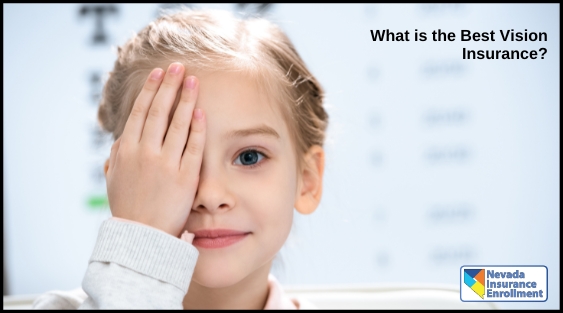Vision Insurance: Are You Getting the Best Value for Your Money?
Health insurance does not cover vision insurance, except children on a family plan. So, if you are among the millions of Americans who have vision problems and rely on glasses or contacts, you may need to consider your options. In most cases, vision insurance is very affordable and can provide significant yearly cost savings on appointments with your eye doctor and corrective lenses. Many companies provide vision coverage, and knowing which ones offer the best value can help you spend your health dollars wisely.

What Is Vision Insurance?
Vision insurance is supplemental health insurance that covers vision-related care. This includes annual visits and emergency care, along with corrective products such as glasses and contacts. Some plans also have coverage for corrective surgery, but generally speaking, eye surgery would be covered under your health insurance plan in almost all cases. Your plan likely has copays (a certain dollar amount you pay towards a given service), coinsurance (a percentage of the cost of a service) or deductibles (an out-of-pocket amount you must meet before your vision insurance kicks in).
The Best Vision Insurance Companies
Nevada residents have numerous vision insurance companies to choose from. Not all plans are available statewide, but a health insurance agent can help you determine what is available in your area.
What to Look For:
- Co-pay for the lenses
- Co-pays for the eye exam
- The “allowance” for the frames
- How often you can get new frames
- What the co-pay or co-insurance covers for single vision, bifocals, and trifocals
Local Favorite / Best Overall: VSP (Vision Service Plan)
Many providers in Nevada accept VSP vision plans. It’s popular, well rounded, has good coverage and many providers accept it. VSP is the nation’s largest nonprofit full-service vision plan. It has more than 55 million members, a network of over 38,000 access points, and 26,000 private-practice doctors. It is a customer favorite for its numerous vision plans and affordable copays.
The Best for Wellness Services: UnitedHealthcare
UnitedHealthcare is among the largest health insurance providers in the nation. Its vision coverage features a modest copay for glasses that offsets the low monthly premium when services are used annually. It also provides coverage for vision correction surgery.
The Best Budget-Friendly Option: Direct Vision Insurance
Direct Vision Insurance’s policies are underwritten by Ameritas, a leading health insurance provider. Direct Vision’s plans have low deductibles and low premiums, helping individuals and families control their costs.

The Best Value: Humana
Humana’s vision insurance plans are simple and straightforward, making it easy to compare coverage options. While discounts are only available when you use in-network providers, you can save money on your enrollment fee and monthly premium by bundling your vision coverage with one of Humana’s dental plans.
The Best for Contact Lens Wearers: EyeMed
EyeMed has numerous network providers throughout the nation, including Target Optical, Pearle Vision and LensCrafters, as well as private-practice doctors. There are three tiered levels for you to choose from, letting you get customized coverage that fits your needs and budget. Its Bright plan provides a generous contact allowance, making it a good option for those who rely on contacts.
Finding Vision Insurance with Nevada Insurance Enrollment
Finding the right vision insurance for your unique needs can provide significant savings. At Nevada Insurance Enrollment, our experienced health insurance agents help you review available plans and find the one that is right for your vision needs.
Recent Posts

What Determines My Health Insurance Premium?
Your health insurance premium amount isn’t random. A variety of factors affect how much you’ll pay every month for your coverage. Under the ACA, there are only a handful of things that can affect your health insurance premium.

How Getting Married Affects Your Health Insurance
Getting married means lots of conversations about combining everything from last names to bank accounts. While picking a health insurance plan that covers both of you may seem practical, there are cases in which maintaining separate policies makes more sense.

How to Save Money on Prescriptions
If you are among the 55 percent of Americans that are taking a prescription drug, you may be concerned about the affordability of medication therapy. Fortunately, there are a couple of things that you can do to ease the financial burden.
Search This Website
Most Popular Pages
By page visits (this month)
#1) Health Insurance Subsidy Chart
#2) Health Insurance
#3) Health Insurance WITH a Subsidy
#4) Insurance Blog
#5) Request a Quote
Top 5 Most Popular
By page visits (this month)
#1) Health Insurance Subsidy Chart
#2) Health Insurance
#3) Health Insurance WITH a Subsidy
#4) Insurance Blog Posts
#5) Request a Quote
Recent Posts
How Many Hours Can You Safely Drive?
If you are not accustomed to spending hours per day in your car, it can be difficult to determine how quickly you should aim to reach your destination.
Safety Tips For Driving In The Rain
In Las Vegas, roads are particularly slick at the beginning of the storm. That is because they are built without a drainage layer. Dust, oil and grime collect on the surface of the road. When it rains and these mix with water, the dirt settles to the bottom and the oil rises to the top, creating a very slick surface.
Understanding Motorcycle Insurance
If you ride a motorcycle, then you need an insurance policy that protects you and your investment. Understanding what coverage is available and even more importantly, what coverage is legally mandated, can ensure that you enjoy your bike for years to come.
Buying a Used Car From a Private Seller
The vehicle’s history report includes information such as its previous owners, open recalls and damage, accidents, repairs, maintenance history, and odometer readings. If you are buying the vehicle from a dealership, then they will probably provide you with the report if you ask for it.
